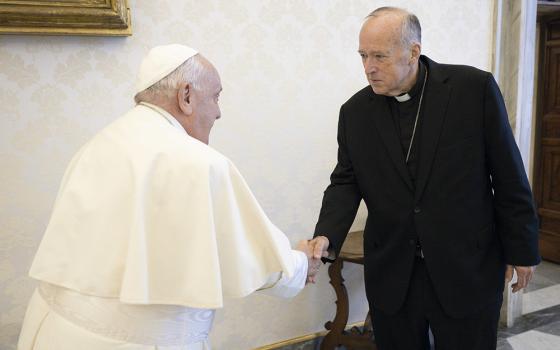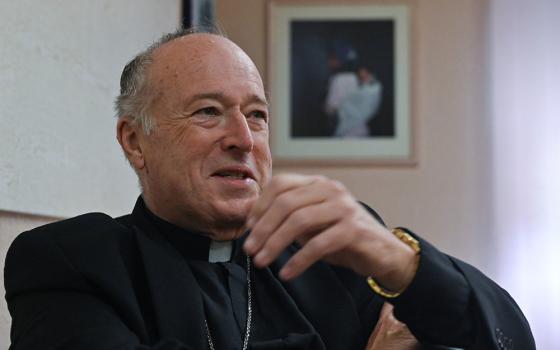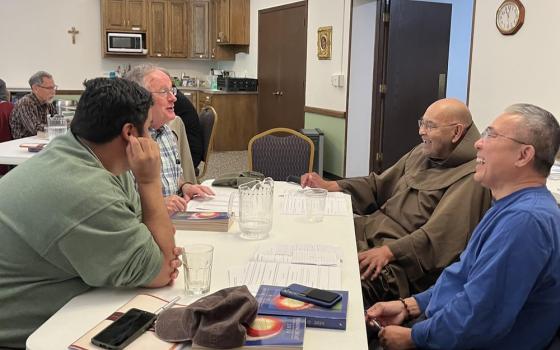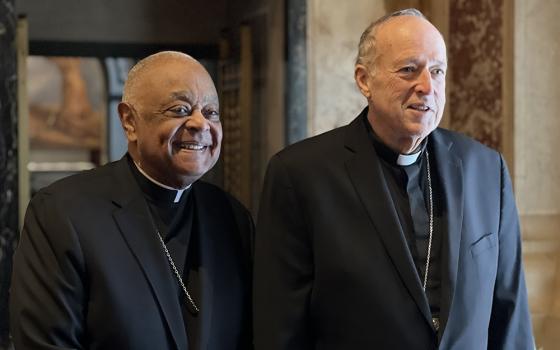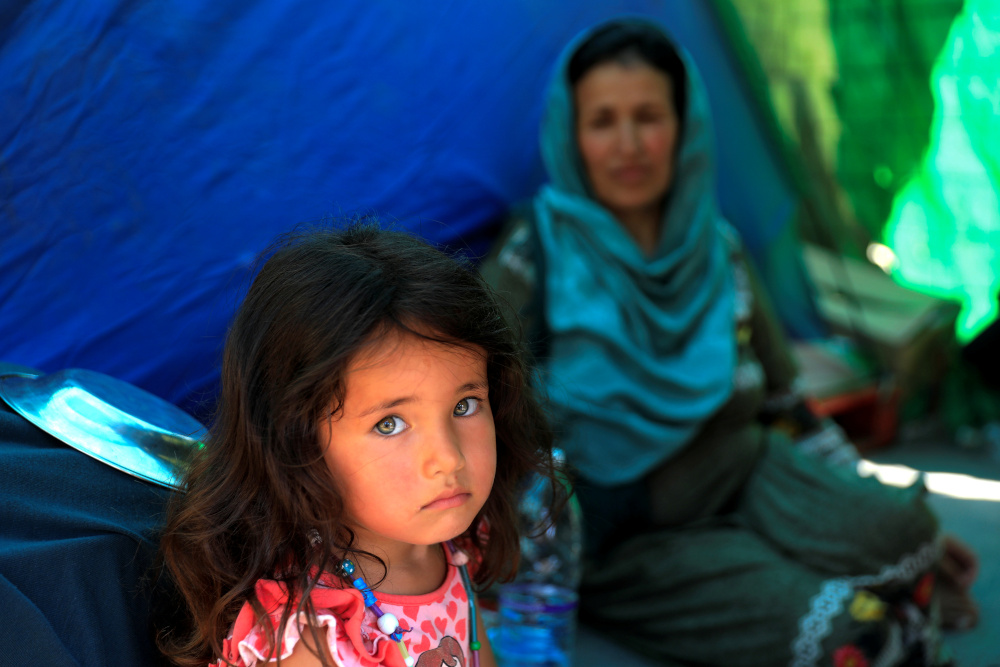
A refugee from Afghanistan sits in her family's tent at a makeshift camp in Samos, Greece, June 25, 2019. Catholic and other faith-based groups said July 19 they are "appalled" by reports officials in the Trump administration are considering "zeroing out" the number of refugees accepted by the United States. (CNS/Reuters/Giorgos Moutafis)
News that officials in the Trump administration are considering "zeroing out" the number of refugees accepted by the United States brought an immediate outcry from the chairman of the U.S. bishops' migration committee and leaders of Catholic and other faith-based agencies that resettle refugees.
They all implored the government to reject such a move.
"This recent report, if true, is disturbing and against the principles we have as a nation and a people, and has the potential to end the refugee resettlement program entirely. The world is in the midst of the greatest humanitarian displacement crisis in almost a century," said Bishop Joe Vasquez of Austin, Texas. "I strongly oppose any further reductions of the refugee resettlement program."
"Offering refuge to those fleeing religious and other persecution has been a cornerstone of what has made this country great and a place of welcome," said the bishop, who is chairman of the U.S. Conference of Catholic Bishops' Committee on Migration.
"Eliminating the refugee resettlement program leaves refugees in harm's way and keeps their families separated across continents," he added in a statement released late July 19.
Politico, a Washington-based news outlet, first reported on the possible stoppage on refugee admissions the evening of July 18. Based on information from three people it said were familiar with the plan, it said the proposal was discussed a week ago at a meeting of security officials on refugee admissions.
Since Congress passed the Refugee Act in 1980, the U.S. had admitted on average 95,000 refugees annually. In recent years, the U.S. has accepted between 50,000 to 75,000 refugees per year. The number was capped at 45,000 after Donald Trump became president in 2017 and was scaled back to 30,000 refugees for fiscal year 2019.
Before admission to the U.S., each refugee undergoes an extensive interviewing, screening and security clearance process.
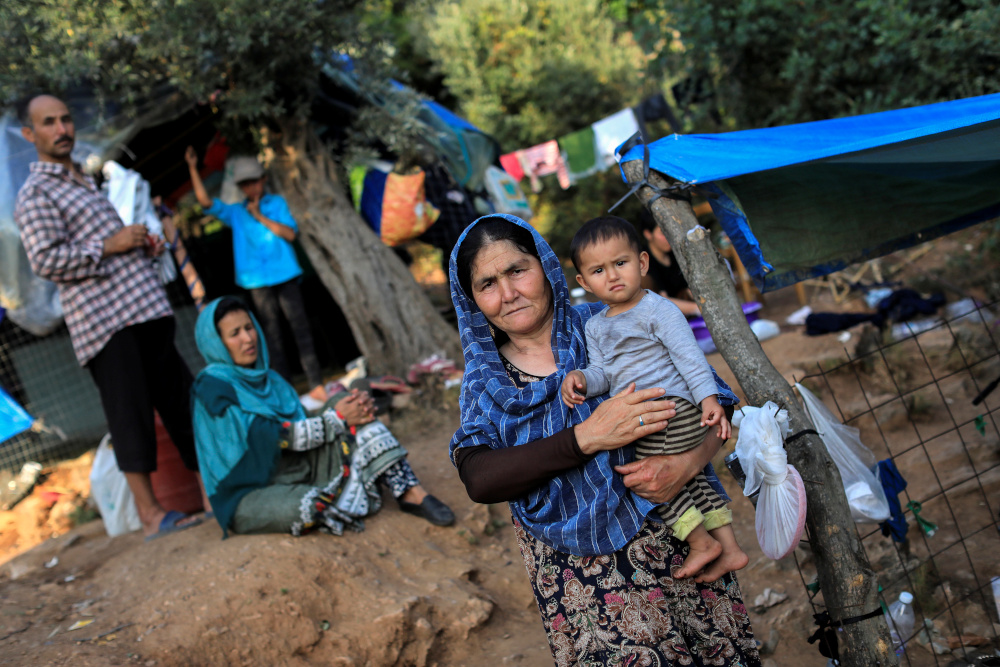
Refugees from Afghanistan are seen at a makeshift camp in Samos, Greece, June 25, 2019. Catholic and other faith-based groups said July 19 they are "appalled" by reports officials in the Trump administration are considering "zeroing out" the number of refugees accepted by the United States. (CNS/Reuters/Giorgos Moutafis)
"Every refugee resettled in the United States goes through an extensive vetting process that often takes 18 months to two years to complete," Vasquez noted in his statement. "(The process) incorporates live interviews and several extensive checks by multiple departments within the government. Many of these refugees have familial ties here and quickly begin working to rebuild their lives and enrich their communities."
A U.S. State Department report said that in fiscal year 2019, the top 10 countries of origin for refugees admitted into the U.S. to be resettled were: Congo, Myanmar, Ukraine, Eritrea, Afghanistan, Syria, Iraq, Sudan, Burundi and Colombia.
Setting caps on the number of refugees to be accepted from five global regions is done at the beginning of each fiscal year by the president, in consultation with Congress. The deadline for this consultation is Sept. 30, according to Jen Smyers, director of policy and advocacy for Church World Service. She told reporters during a phone briefing midday July 19 that the U.S. secretary of state "makes the final decision."
In its story, Politico said the State Department "declined to discuss the possible cap."
Other refugee advocates on the briefing with reporters included Michael Breen, a former Army officer, who is president and CEO of Human Rights First. He called it a "misguided and terrible" proposal.
He noted that resettlement of refugees is vital to the "national security and stability" of the U.S., makes this country a world leader and also has been an essential foreign policy tool, allowing into this country, among others, dissidents fleeing their own governments, those persecuted for their religion and Iraqis who have helped the armed forces as translators.
Anne Richard, a former assistant secretary of state for population, refugees and migration in the Obama administration, who is now at Georgetown University, told reporters that "it's pretty clear the Trump administration is trying to drive the U.S. refugee program into the ground."
"Zeroing it out" will end public-private partnerships that work with refugees and get them started on a new life in this country and all related services, she said. People will lose their jobs in this field, the institutional memory as to how these resettlement programs work "will disappear" and the U.S. "will be turning its back on this great need," Richard added.
"The last couple of years have been historically low in terms of refugee resettlement here in the U.S.," said Bill Canny, executive director of the U.S. Conference of Catholic Bishops' Migration and Refugee Services. "Of the millions of refugees around the world, only about 1% will be resettled, that number will decrease and leave more people vulnerable if these actions come to fruition."
Advertisement
"I would implore the decision-makers to reconsider these devastating cuts," Canny said July 19 in remarks to Catholic News Service. "Our military relies on the work of interpreters while in the field and those interpreters are putting their lives and their families lives on the line. To not open our arms to them when they have done so for us, would go against who we are as a nation."
In a statement late July 18, Krish O'Mara Vignarajah, president and CEO of Lutheran Immigration and Refugee Service, said: "It is horrifying to think that, by the stroke of a pen, the president can make a decision that will destroy a legacy of welcome that has been centuries in the making."
Lutheran Immigration and Refugee Service and the bishops' Migration and Refugee Services are two of nine voluntary agencies currently charged with refugee resettlement in the U.S.
"LIRS has been doing this work for 80 years. We have seen firsthand the life-changing impact of this crucial program," Vignarajah added. She herself is a former refugee, having come to the U.S. with her family from Sri Lanka when she was 9 months old.
"Setting the U.S. refugee ceiling at zero would be an egregious assault on fundamental American values. And quite frankly, the humanitarian implications of this decision would be enough to nullify our global reputation as leaders of the free world," Vignarajah said. "(Trump) simply cannot afford to move forward with this proposal – not if he seeks ongoing support from people of faith all across the United States."
Refugee Council USA, a coalition of organizations committed to refugee resettlement and protection which includes MRS and LIRS, said July 18 it was "appalled" by the proposal to "zero out" the refugee number.
"The administration has all but confirmed that our country will reach the 30,000 refugee admission goal for FY2019," Canny, of MRS, said in a statement released by the council, which he chairs. "We have been relieved by that important sign of the program getting back on track after a couple of extremely difficult years. In light of that hopeful sign, reports of further reducing the refugee goal to zero make no sense at all."
He added: "There continue to be refugees who need the protection that resettlement provides, including refugees who are fleeing religious persecution. Faith based communities and volunteers across the U.S. have the desire, capacity and resources to return to at least our historically normal level of welcoming refugees."
Vasquez ended his statement referring to Pope Francis' words that "we must work for 'globalization of solidarity' with refugees, not a globalization of indifference."
"Rather than ending the program, we should work instead to restore the program to its historic norms of an annual resettlement goal of 95,000," the bishop added.
